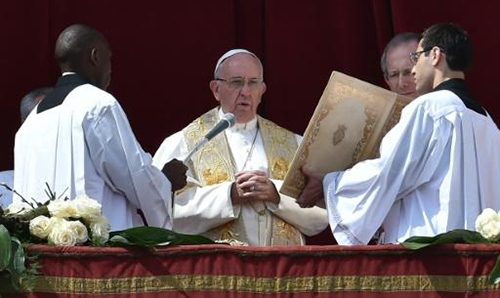Pope set to visit refugees in Greece as expulsions stalled
Athens: Pope Francis will travel to the Greek island of Lesbos on the frontline of Europe's refugee crisis next week, Greece announced Tuesday as a controversial EU accord to send migrants back to Turkey stalled.
The papal trip to Lesbos, accompanied by the head of the Eastern Orthodox Church, is likely to pile pressure on European leaders already criticised for the deal with Turkey, which aims to defuse Europe's worst migration crisis since World War II by curbing the influx of people.
"The Greek government will welcome Pope Francis and the Ecumenical Patriarch Bartholomew as valuable defenders of support to refugees, and Greek Prime Minister Alexis Tsipras will go with (them) to the island of Lesbos," a government source in Athens said.
News of the papal visit came as a last-minute rush of asylum applications stalled operations to return migrants from Greece to Turkey under a deal signed in March.
The holiday island of Lesbos has served as a major gateway for refugees and other migrants hoping to start new lives in Europe, with hundreds of thousands of people sailing there in flimsy boats from the nearby Turkish coast over the past year.
The government source declined to give a precise date for the visit by Francis and Bartholomew, but indicated it could take place on April 14 or 15.
The Greek Orthodox Church earlier said it had approved plans for a papal visit to Lesbos island after Francis expressed a desire to "shed light on the major humanitarian problem" of the migrant influx.
The pope has previously spoken out on the migrant crisis, using his recent Easter address to criticise the "rejection" of refugees.
- Hunger strike -
The process of returning migrants, mainly Syrians, to Turkey has been slowed "by an increase in asylum requests" in the last few days by migrants on Chios and Lesbos, the Greek Aegean islands in the front line of the migratory wave, said Greek official Yiorgos Kyritsis.
Kyritsis, the spokesman for the Greek government panel coordinating the migration crisis, said no operations were planned for Tuesday.
A Turkish official said the next transfer of migrants "has been postponed to Friday" at Greece's request
"Greece could not send the people. Everything is ready here but we received a message from the Greek side," added the official, after others had spoken of a possible resumption of the transfers on Wednesday.
All "irregular migrants" arriving in Greece since March 20 face being sent back, although the EU deal calls for each case to be examined individually.
Out of around 6,000 migrants who arrived on Chios and Lesbos after the March 20 deadline, more than 2,300 have now applied for asylum, Kyritsis said. Greece on Monday expelled 202 migrants under the deal.
Tensions were running high among migrants on the Greek islands.
On Samos, just a mile (1.6 kilometres) by sea from Turkey, Ali, a Pakistani, told AFP b y phone that a hundred migrants had gone on hunger-strike.
"We risk our lives to come here, we don't want to go back to Turkey because they are going to send us back to Pakistan. We don't want to apply for asylum in Greece, we want to go to Germany," he said.
- Fears for deported -
The EU border agency Frontex said the return of migrants to Turkey on Monday had taken place in a "very calm... orderly" operation, but on Tuesday the UN High Commissioner for Refugees (UNHCR) raised fears for some of those deported.
"We are concerned that 13 people, most of them Afghans, who expressed the wish to request asylum were unable to be registered in time," the UNHCR's representative in Greece, Philippe Leclerc, told AFP.
Under last month's deal, for every Syrian refugee returned, another Syrian refugee will be resettled from Turkey to the European Union, with numbers capped at 72,000.
The Netherlands on Tuesday took in 31 refugees arriving from Turkey as part of the controversial EU deal after Germany received 32 asylum-seekers on Monday.
The idea is to encourage Syrians seeking to flee to Europe to stay safely in Turkey, with the prospect of asylum, rather than try to make the dangerous sea crossing in the hands of ruthless smugglers.
Critics of the March 18 deal include Amnesty International, which says Turkey is not a safe country for refugees -- a charge Ankara rejects.
More than a million people arrived in Europe in 2015, many of them from war-ravaged Syria.
According to the International Organization for Migration over 170,000 more have arrived in EU nations so far this year, the vast majority arriving in Greece.
Related Posts

